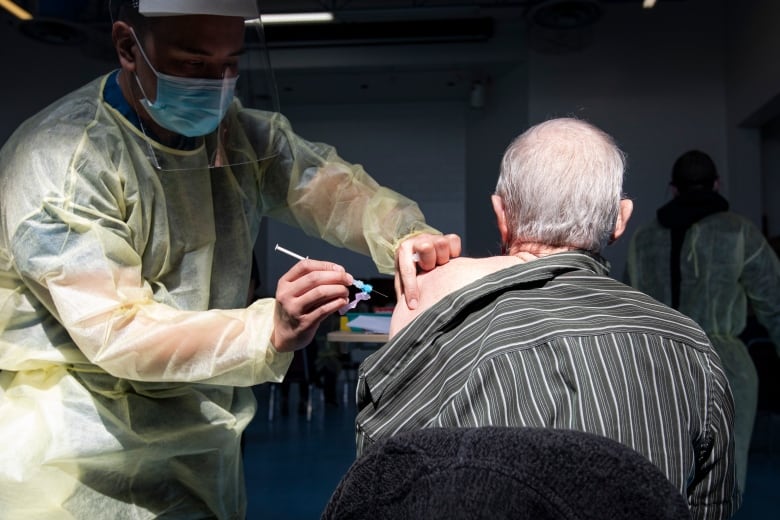N.B. changes definition of 'serious' COVID-19 vaccine reactions, cuts number in half
Serious reactions drop to 154 from 313 after province adopts federal definition to enable comparison of data

New Brunswick has changed how it defines "serious" reactions to COVID-19 vaccines and using this new definition, the number has been cut in half.
There have been 154 serious adverse events following immunization reported over a 32-month period ending this past summer, according to Department of Health spokesperson Sean Hatchard.
That's one serious incident for every 13,550 COVID-19 vaccinations administered in New Brunswick between Dec. 14, 2020, and Aug. 26, 2023 — a significant improvement over previous reports.
The province had been reporting 313 "serious and medically important" reactions before the definition of what constitutes a serious reaction was changed.
New Brunswick adopted the definition of a serious adverse event used by the Public Health Agency of Canada in February, Hatchard confirmed. "This was done to align with the national definition … which allows for more effective comparisons of data with other Canadian jurisdictions," he said.
"As part of this process, the Department of Health reviewed all reported [adverse events following immunization] and reclassified them to match the national definition."
As a result, some "medically important events" have been reclassified as "non-serious" and removed from the total.
What is a 'serious' reaction?
The Public Health Agency of Canada defines adverse events following immunization as "any untoward medical occurrence that follows and isn't necessarily causally related to the usage of the vaccine." The adverse event may be "any unfavourable or unintended sign, abnormal laboratory finding, symptom, or disease."
An event is considered serious if it "results in death, is life-threatening, requires in-patient hospitalization or prolongation of existing hospitalization, results in persistent or significant disability/incapacity, or results in a congenital anomaly/birth defect."
New Brunswick previously combined "serious" and "medically important" adverse events in the same category to be "hypervigilant," said Hatchard.
"The COVID-19 vaccines were new and we wanted to ensure we monitored extremely closely," he said. These were sent to the agency "for its support in classification and/or further expert follow-up."

Now, a medically important event can be classified as serious or non-serious.
According to the Public Health Agency, a non-serious medically important event may not be immediately life-threatening but requires intervention to prevent one of the outcomes listed in the definition of a serious adverse event.
As an example, Hatchard cited a neurological event, with the main reaction being Bell's palsy.
"The case was never hospitalized or had any criteria to meet the definition of a serious [adverse event following immunization] and was managed by a physician to prevent any of the outcomes listed in the definition" of a serious event. That event does not meet the definition, he said, "while it is considered medically important."
No XBB.1.5 reactions so far
Between December 2020 and this past August, New Brunswick residents received nearly 2.1 million vaccines. According to the province's revised figures, there were 1,170 adverse reactions reported — about one following every 1,800 shots, but most of those have been classified as non-serious.
Of the 154 serious reactions, Hatchard did not provide any breakdowns of the types of reactions, types of vaccines or age groups.

The Department of Health has not received any reports of adverse events following immunization with the updated COVID-19 XBB.1.5 vaccines, available in the province since Oct. 4, said Hatchard.
As of Oct. 30, 2023, there were 31,174 doses of the Moderna Spikevax administered and 10,073 doses of the Pfizer Comirnaty, he said.
This isn't the first time New Brunswick has changed COVID-related definitions.
As of September, only people with confirmed COVID who die in hospital are counted as COVID deaths, and the pandemic death toll was revised at least twice last year after the department began defining COVID-related deaths as those where the virus was either the primary cause of death or a directly contributing factor.
The province also reverted in September to counting COVID hospitalizations as patients hospitalized both for and with the virus. Since April 2022, the province has been counting only people who were hospitalized because of the virus. People who were initially admitted to hospital for another reason and later tested positive for COVID were no longer included.
Benefits outweigh risks
The Public Health Agency "is clear that evidence indicates the benefits of COVID-19 vaccines continue to outweigh the risks of contracting the disease," Hatchard said in an emailed statement.
He noted that vaccine providers are legally required to report any adverse events in New Brunswick under the Public Health Act, and immunization data is "regularly monitored to ensure that any unusual safety trends would be identified quickly.
Federal health officials also review data from provinces and territories across the country to identify any new or emerging trends, he added.
